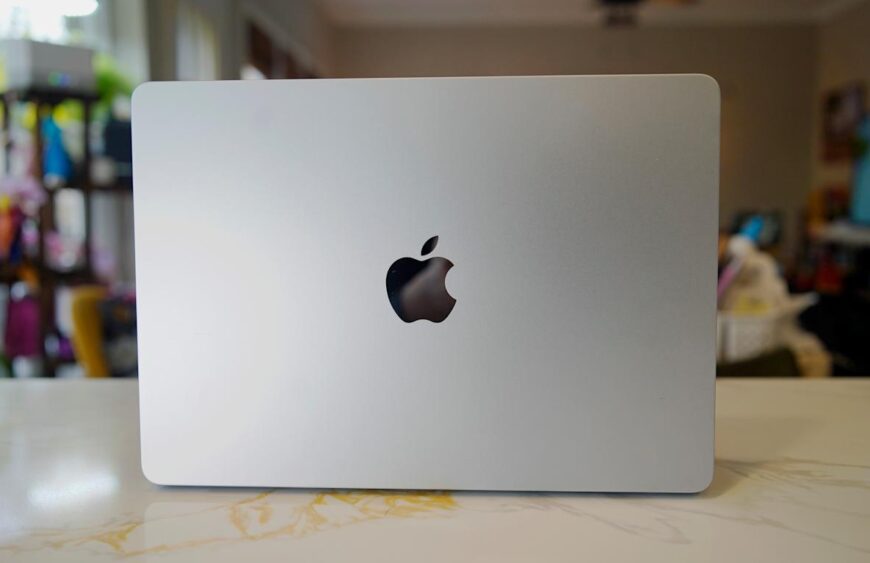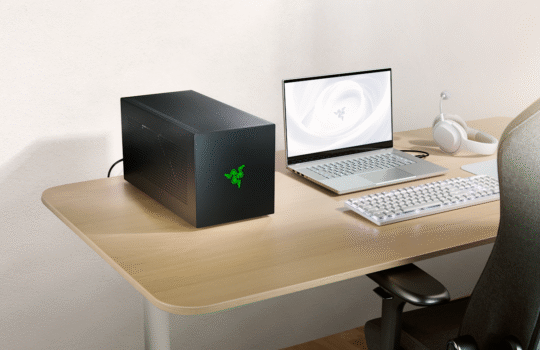Is it a good time to move to Macs from Windows?

Q: I’m a Gen X Windows user, I’ve been building my own systems for decades, and I work mainly in 3D design for the building and construction industry. I would like to know if you feel switching to Mac makes sense with all this unnecessary tariff turmoil?
I’ve been trying to make the leap for years … I feel like I need someone to just tell me to go for it and not look back. — Jim from Bainbridge Island, Washington
A: It’s undoubtedly a great time to make the jump from Windows to Macs. The MacBook Air and MacBook Pro are among the highest-rated laptops we’ve reviewed over the last few years, and the Mac mini and iMac are also fantastic solutions for desktop users. There’s certainly a bit of a learning curve when jumping platforms, but it’s mostly just a problem if you require specialized software that only runs on Windows.
What are the benefits of moving from Windows to Mac?
There are three big advantages from switching from Windows to Mac.
Speed
At the moment, the biggest advantage is the sheer speed of Macs. That’s entirely thanks to Apple Silicon, the company’s custom chips that are built to be efficient and very fast. In our benchmarks, even the most basic M4 chip blows away most of the hardware from Intel and AMD. Apple’s advantage only grows as you move up to its Pro, Max and Ultra chips.
Apple Silicon’s speed doesn’t just show up in benchmarks. It’s easy to see that modern Macs, even the entry-level MacBook Air, feel zippier than comparably-priced Windows PCs. That goes for everything including web browsing and office productivity apps, as well as more complex tasks like rendering video. Apple’s chips also include some powerful graphics cores, giving you the ability to easily run many games from the App Store. While you certainly wouldn’t mistake any Mac as a true gaming PC, I was still surprised that the MacBook Air was able to run a complex new game like Lies of P in 1080p at 60 fps.
Battery life
Since Apple Silicon is based on Arm’s mobile chip architecture, it’s also a lot more efficient than Intel and AMD’s more demanding CPUs. That leads to killer battery life across the board for Mac laptops. Both the 13-inch and 15-inch MacBook Air lasted well over 18 hours in our video benchmark, while the MacBook Pros went beyond 30 hours. In real-world usage, you can expect most Macs to last two full work days without needing a charge. Macs also tend to hold their charge in standby mode far better than PCs, so you can have a bit more faith that they’ll be ready to work the instant you turn them on.
Durability
After reviewing Macs for the last 15 years, and supporting them as an IT worker for a decade before that, I can also confidently say that Mac hardware lasts longer than PCs. Apple’s aluminum cases withstand bumps and drops far better than the cheap plastic you’ll find on some PCs. Now that’s not to say they’re immune to wear and tear, but from what I’ve seen Macs just tend to hold up well. If you do need to get something fixed, it’s also relatively easy to get that done at an Apple Store, instead of shipping a Windows PC off to its maker.
What are the downsides of switching from Windows to Macs?
While I think it’s worth making the jump to Macs overall, there are a few downsides:
Windows to Mac learning curve
Given how much of our computing lives revolve around cloud apps like Gmail and Google Docs these days, moving to Macs mainly involves learning the basics of Apple’s platforms. Installing software outside of the App Store works a bit differently than Windows — you often have to drag an app to the Applications folder, instead of clicking through an installer. Apple’s trackpads also don’t support right-clicking by default. Instead, you either have to hold down the Control key and click, or enable a Secondary Click feature (System Preferences > Trackpad). There you can assign right-clicks to a two-finger tap, or a tap on the bottom corners of the trackpad.
The macOS Dock can be confusing since it can’t show all of your open apps like the Windows taskbar can. Subsequently, managing all of your open apps can be a pain. My suggestion? Set up Hot Corners (System Settings > Desktop and Dock > Hot Corners) so that your Mac will reveal your apps whenever you drag your pointer to a corner of your screen.
Since that feature debuted (it was originally called Expose), I’ve set it up to reveal current app windows in one corner, all of my windows in another, and the desktop in a third. Apple’s Stage Manager, which debuted in macOS Ventura, can also help you wrangle apps, but I typically only use that when I want to focus on one or two programs.
Lackluster gaming library, limited upgrade options
Apple has historically been terrible when it comes to supporting games on macOS, but it’s getting better. Recent titles like the aforementioned Lies of P, as well as Resident Evil Village and Death Stranding, are readily available on the app store. There are also more titles on Steam shipping with dedicated Mac support, and cloud streaming opens up access to services like Microsoft’s Xbox Game Pass library.
But there’s no way Apple will be able to catch up with Windows when it comes to overall gaming support anytime soon. So if you actually care about always getting the latest titles, you might want to stick with PCs. That’s doubly true if you also have any interest in ever wanting to upgrade video cards, RAM or internal storage options, all of which aren’t really accessible on Macs — including desktop models.
No touchscreen support
While Apple pioneered the use of touchscreens with the iPhone and iPad, it’s stubbornly refused to bring that feature over to Macs. So if you’re used to casually flicking a laptop’s screen to scroll, you’re just out of luck with Macs… for now. A 2023 report claimed that we may see a touchscreen MacBook Pro this year, but it’s unclear if that will actually happen. Personally, I don’t miss having a touchscreen when I use Macs, since Apple’s glass touchpads feel just as fluid.
A brief history of Mac vs. Windows
The battle between Mac and Windows is nearly as old as the concept of personal computing itself, and it will likely never end. In 1983, Apple’s Lisa broke new ground as the first consumer computer with a graphical user interface (GUI), and the company followed that up with the more affordable Macintosh in 1984. Microsoft countered with Windows 1.0 in 1985, but the platform didn’t really take off until Windows 3.0 arrived in 1990.
By that point, the philosophical differences between the two companies was clear: Apple was more focused on delivering friendly user experiences for its custom hardware, while Microsoft built up Windows as a platform that could run on a wide variety of computers. Consequently, the user culture around both platforms became fairly distinct: Macs became the go-to choice for anyone working in creative fields and academia, whereas Windows was more focused on office work and straightforward productivity. There’s also always been a major price difference between the platforms, as Apple’s custom hardware has typically cost far more than your basic Windows PC.
Over the years, Apple has gone from using Motorola’s PowerPC chips to Intel’s — a move that brought Macs far closer to Windows PCs. And most recently, Apple completely changed things up again by moving entirely to its own Apple Silicon chips, which are built around the same mobile architecture used by iPhones and iPads.
While Macs and Windows remain very distinct, the differences between them have flattened a bit now that we’re relying on so many cloud services. Using Gmail or Google Docs on a Mac is no different than on a Windows system, after all.
Which Mac is best for you?
It may sound cliche to say this, but Apple’s Mac family now has something for everyone (unless you’re a hardcore gamer). We’re four generations deep into Apple Silicon chips, and all of the company’s hardware has seen some helpful impressive revisions. The real question is figuring out which Mac is best for you.
A note on pricing: While Apple’s entry-level prices are more reasonable than ever before, they do skyrocket as you add more RAM and storage. You also can’t add more memory or storage to Apple Silicon systems down the line, so you’ll have to think hard about what you need when you buy a new Mac. I’d recommend prioritizing more RAM when possible, as you could always use cloud services or external drives for storage beyond your SSD. I’d also suggest snagging a new Mac soon if you’re interested, as there’s a chance Apple could start increasing prices to keep up with tariffs. (Just recently, both Microsoft and DJI have increased prices for aging devices.)
But if you’re finally ready to pull the trigger on a new Mac, these are your best options right now. You can also find some excellent deals if you look for refurbished M3 and M2 versions of the systems below.
The MacBook Air is the best ultraportable laptop available today. It’s fast, incredibly light, has great battery life and is also completely silent, since it has no cooling fan. Now that it starts at $999 with 16GB of RAM, it’s also a surprisingly good deal. Unless you need the additional ports and improved screen on the MacBook Pro, the Air will be all the computer you need for several years.
Stepping up to the MacBook Pro gets you a high refresh rate screen, faster M4 Pro chips and a wide variety of ports (including more USB-C connections, a microSD card reader and HDMI). While it’s heavier than the Air, the 14-inch MacBook Pro is still relatively light and is better-suited to sustained workloads, like video encoding or 3D rendering. The 16-inch MacBook Pro is pretty much the same machine with a larger screen.
Starting at $599 (but often on sale for much less), the Mac mini is a powerful-yet-tiny box that can outmatch full-sized Windows desktops. It’s the ideal gateway to the world of Macs if you already have a monitor, keyboard and mouse you like. The base model is powerful enough to handle any productivity task you throw at it, but if you need more performance you can also step up to the M4 Pro-equipped Mac mini. In addition to shrinking it down for this latest revision, Apple also seems to have heard my complaints and added two USB-C ports to the front of the Mac mini. Together with three more USB-C ports on the rear, HDMI and Ethernet, the Mac mini serves up a comprehensive array of ports and it’s hard to think of a more capable $600 PC.
While the iMac isn’t the first all-in-one desktop computer, it’s popularized the form factor to the point where most PC makers have their own copycat products. Now with an M4 chip, the iMac is more powerful than ever, while also sporting a thin profile that means it fits right at home on a kitchen table. Its 24-inch screen is just right for getting a bit of work done without dominating a table, and its speakers also sound surprisingly great. The iMac is the ideal family computer, one that can be set up just about anywhere and be useful for kids and parents alike.
If you need more power than the Mac mini, the Mac Studio is a powerhouse of a desktop. While it’s still far smaller than a typical Windows desktop, its M4 Max and M4 Ultra chips can easily take on the best hardware from Intel and AMD. At this point, the Mac Studio is more of a Mac for professionals than the actual Mac Pro, which is far more expensive and more meant for high-level corporate work.
Have a tech question you’d like Engadget to answer?
As tech reporters, the Engadget staff is always answering questions from readers, friends and family about electronics, software, gaming, big tech policies and more. So we decided to write down our answers. This question came from a listener of The Engadget Podcast, and has been lightly edited for clarity and brevity. If you’ve got a tech-related question you’d like us to answer for you, please email ask@engadget.com.
Trending Products






